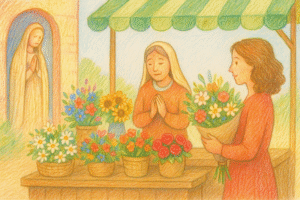Mark Twain says that once he met a business man. This man was telling him his project. At some point he said: before I die I will go to the Holy Land. I will go to the summit of Mount Sinai and I will read the ten commandments out loud. Mark Twain said to him: you could do something better, you can stay at home in Boston and fulfill them. This story is about hypocrisy.
Hypocrisy is the practice of professing standards, beliefs, etc. which are contrary to one’s real character or actual behavior, especially under the pretense of virtue and piety. This happens because we usually see our virtues and the defects of others instead of seeing the virtues of others and our own defects.
Hypocrisy is a lie and goes against the virtue of truth. St. Thomas explains that truth can be considered in two ways: a thing that is said to be true, like when we say a tree is a true tree, there is no virtue by which the tree is a tree. In this sense truth is not a virtue but something that is in the thing.
But truth can be considered as something that is said by a person and that person is called truthful. To say the truth is a good action and a virtue is that which makes its possessor good and makes his actions good. In this sense truth is a virtue.
As a virtue, truth can grow. We can make our virtues increase or decrease, and in order to be sincere with ourselves and not to be hypocritical it is necessary to grow in this virtue. I will dare to say that to be sincere with ourselves is the last step of this virtue.
In fact, it is not like we usually want to deceive other people. For example, we do not think: “I want to make him think that I am a holy person” but rather the problem is that we do not realize that we are not what we think we are. The problem is that we deceive ourselves and the reason we deceive ourselves is our lack of the virtue of truth.
In order to grow in this virtue, it is helpful to think about who I am in front of God. We are who we are in front of God and not in front of people. People can think that I am an excellent person but it does not mean that I am an excellent person. What people think about me will not change myself. We must not be worried about what others think about me, we must be worried about what God thinks about me.
Another thing that could be helpful in order to grow in this virtue is to listen to people when they highlight my defects, mistakes, faults, etc., because if I heed what they say it will be easier for me to realize that I am deceiving myself, thinking that I am what I am not.
The third thing that could be helpful is to reflect upon my actions, words, thoughts and also my omissions. If we ask ourselves why did I say this, do this, or think this, also if we ask why I did not do this, say this, etc. we will understand who we are and it will help us to grow in the virtue of truth.






